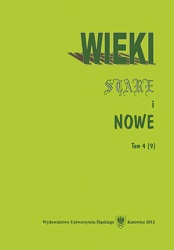Biskup wrocławski Georg Kopp a kwestia polska na Górnym Śląsku w opinii polskojęzycznej prasy górnośląskiej
The Bishop of Wrocław Georg Kopp and the Polish issue in the Upper Silesia in accounts of Polish-language newspapers of the Upper Silesia
Author(s): Jakub GrudniewskiSubject(s): History
Published by: Wydawnictwo Uniwersytetu Śląskiego
Summary/Abstract: The Prince-Bishop of Wrocław George Kopp was a controversial figure because of his attitude to the Polish-speaking population in the Upper Silesia. On the one hand, he had great merits for the development of the religious life and the network of parishes in the area of Diocese of Wrocław. On the other hand, he was known for his disapproving attitude to the Polish issue, including the presence of Polish language in the public life in the Upper Silesia, and also to the Polish national movement, the leader of which was Wojciech Korfanty. Specially interesting source for researching these problems is Polish-language Upper-Silesian press. The present work bases on the newspaper titles representing different political orientations: Katolik (Catholic), Górnoślązak (Upper-Silesian), Polak (The Pole) and Gazeta Robotnicza (Workers Gazette). In Polish-language Upper-Silesian press wide political and pastoral work of the Bishop of Wrocław Georg Kopp was rendered only partially. The preliminary source research shown that the press was interested in the figure of Bishop of Wrocław only in connection to the Polish issues in the Upper Silesia. It was triggered by the profile and ideological presumptions of each of the press titles. They supported, in variety of ways, the endeavor of the Poles to have equal language rights in the Upper Silesia. The most space was devoted to Kopp in Katolik, where he was presented in relatively nonpartisan manner. It stemmed form the clerical character of the newspaper that decided to pay respect to the bishop as the Head of Silesian Church. But, in Górnoślązak and Polak, because of national profile of those titles, the cardinal had been criticized from the very beginning. Especially in years 1901—1905, when the Polish national movement in the Upper Silesia was the most impetuous, the papers focuses mainly on the eponymous topic. In anticlerical Gazeta Robotnicza, on the other hand, not so much information about Cardinal Kopp appeared. In the few articles that he was present, he had been rendered as decisively negative character. Basing on the analysis of the press, the evolution of the Bishop’s views on Polish issue in the Upper Silesia can be traced. The analysis also shows that Katolik, contrary to Górnoślązak, Polak and Gazeta Robotnicza, noticed in the person of bishop Kopp not only the agent of Germanization, but also emphasized his merits in the field of pastoral work, in which he was just towards the Polish-speaking population.
Journal: Wieki Stare i Nowe
- Issue Year: 9/2012
- Issue No: 4
- Page Range: 81-113
- Page Count: 33
- Language: Polish

